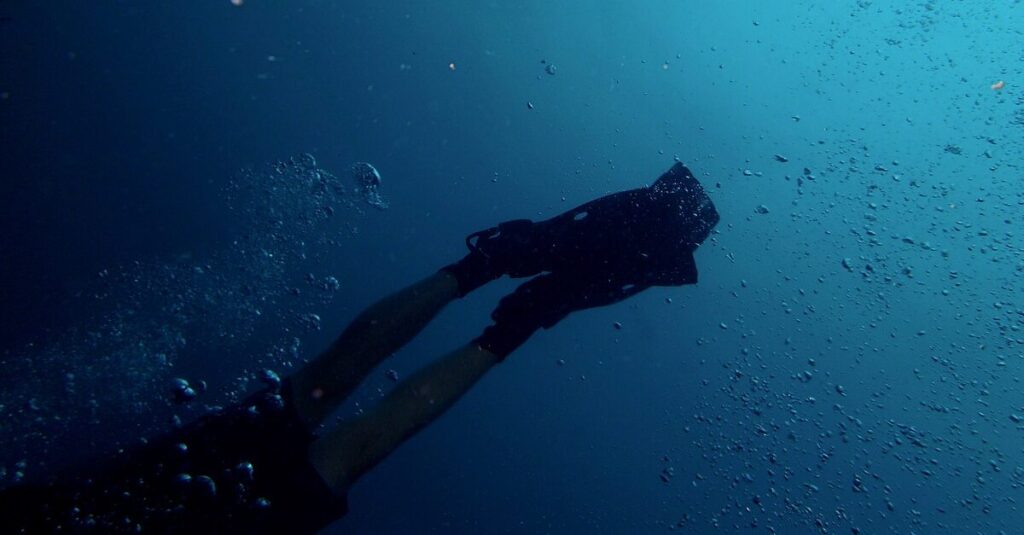

You can use freediving fins for scuba diving, but they aren’t the best option. They’re more difficult to use in tight spaces and don’t offer the control needed for precision kicks and turns.
While freediving fins work in certain applications, there are plenty of reasons not to use them for scuba diving. Keep reading to learn how they differ from traditional scuba fins, what to consider when purchasing fins, and certain nuances of the longer fin length.
Can You Use Freediving Fins for Scuba?
You can use freediving fins for scuba diving, but they aren’t the best choice.
If you’re in a situation where you freedive and scuba dive but can only purchase one pair of fins, you’ll want to get freediving fins. This is the only way to get the power needed to freedive successfully and satisfactorily.
Freediving fins are much longer, which makes them difficult to use in many scuba diving maneuvers, but you need this to help you swim against strong currents and use air more efficiently when freediving.
If you’re only looking to scuba dive, you’re better off finding a pair of scuba fins that suit your needs. They come in many varieties, so you have better control over:
- Length
- Coverage
- Flexibility
For example, most freediving fins cover the whole foot, but many scuba divers prefer an open-back design for comfort and versatility.
Pros of Freediving Fins for Scuba Diving
Freediving fins are great for:
- Covering more ground
- Moving quickly through the water
- Efficient use of air and energy
- Those who only prefer a full pocket design
For those who freedive often and don’t mind the cons, a pair of freediving fins can be the most economical.
Cons of Freediving Fins for Scuba Diving
There are many reasons scuba divers don’t choose these fins, including:
- Their awkward length (and difficulty when traveling)
- The unique skills and strength needed for use
- Cost for higher quality fins
- Difficulty with small maneuvers/in tight spaces
This is why those that only scuba dive usually stick with scuba diving fins for the sport.
What to Look for When Buying Fins for Scuba Diving
Most of your decision when looking for fins for scuba diving surround the type of fins, the material, and their fit.
Freediving fins work fine and may be preferred for scuba divers that need to cover more ground, but scuba diving fins are the best choice in most situations.
The most common materials you see are:
- Plastic: Inexpensive, but lacks performance
- Fiberglass composite: Superior performance and great middle ground for budget
- Carbon: Top-tier, but cost much more; usually limited to professional applications
Fins should fit perfectly as comfortable extensions of your foot, and sizing differs between manufacturers. Dive boots increase the comfort for fins with foot pockets, and they help keep you warm. Some manufacturers assume you’ll wear them when setting up their size chart.
Can You Use Long Fins for Scuba Diving?
Long fins work well for scuba diving, and they aren’t limited to freediving fins. Some scuba fins come in longer lengths to reach for the benefits of freediving fins.
A fin’s responsiveness refers to how it reacts to kicking and how that benefits you. When you kick in the water, the blade blends, and the material starts to straighten. When it finally snaps into the place, this propels you forward.
Long fins have greater responsiveness than smaller fins because they displace more water, allowing you to move faster and more efficiently through the water. This works well for some scuba diving applications, but it’s particularly important for freediving.
Why Are Freediving Fins Longer than Scuba Fins?
Freediving fins are always longer than scuba fins because of the desire for good responsiveness in fins.
Freedivers are limited by how far they can travel off a breath of air and how long they can last in the water. Longer freediving fins made of the right material with high responsiveness allow freedivers to get the most out of their diving experience by:
- Traveling faster
- Traveling farther
- Using less energy
- Providing more protection for emergency surfacing
Freediving fins help divers cover more ground and get around safely underwater.
Traveling With Long Fins
Some airlines do not allow you to bring freediving fins on the plane because they are too long, and we strongly urge against checking them.
Adjustable fins allow you to screw the blade off and decrease the overall length. Otherwise, a freediving fin bag offers great protection against breakage during travel.
Do You Need Fins to Scuba Dive?
Fins are an essential part of scuba diving. While some shore divers can get by with diving booties, most divers need to use fins.
Similar to the importance of specialized freediving fins, scuba diving fins:
- Give you the power needed to travel at depth
- Provide more security when you need to surface
- Protect your feet
- Streamline your body for efficient movement
- Help you conserve air and energy
It can take a while to get used to swimming with fins, but there is very little reason not to use them. The benefits and safety offered by scuba diving fins far outweigh any arguments against them.
References
https://openwaterhq.com/freediving/vs-scuba-fins/
https://wanderlass.com/others/diving/scuba-diving-with-long-fins.html
https://freedivingfreedom.com/equipment-info/why-are-freediving-fins-so-long/
